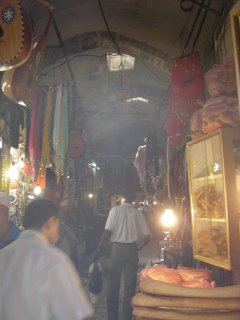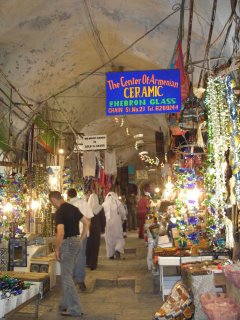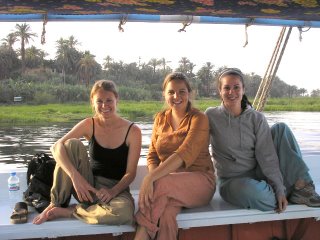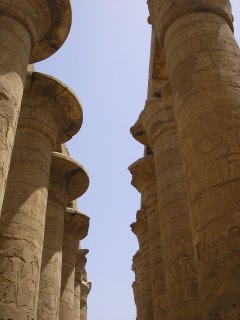America Lust and Ambivalence
Contrary to what Ann Coulter would have you believe, I'm a committed, card-carrying, Kerry campaign-contributing member of the DNC--and I don't hate America. In fact, I love it. A lot. I've been gone for almost 11 months now, and not only do I appreciate America more than ever, but I also have a raging case of America-lust.
As my departure date (July 7) draws closer, my mental list of things I want to see and do, foods I want to eat, and people I want to visit when I get home grows increasingly long. In fact, it's getting kind of ridiculous. Right now, it stands as the following:
1) Eat Mexican food until my parents have to hire an entire construction crew to lift my enchalada-fajita-guacamole filled self out of the restaurant.
2) See my dog, to whom I will speak in an annoying, high-pitched voice, as I tell her how much I wove, wove, wove my pwecious puppy. She will jump all over me, and the embittered "I know what you're doing, Miss Dragging-Massive-Suitcases-Down-The-Stairs, and I'm not happy about it" looks she gave me the night before I left will be forgotten.
3) Go bike riding.
4) Go to Target. Buy stuff that they don't have here.
5) Go to Whole Foods. Buy food that they don't have here.
6) Eat enough Thai and Indian food that my parents will have to call the construction crew again. They should probably hire them for a full month, just to be on the safe side.
7) Hook up the kicka** speakers for my laptop that make my MP3's sound like they're coming from a pimped-out gangsta car with eight subwoofers. Subsequently annoy parents with incessant music playing.
8) Watch TV, in English, and be thrilled by my ability to understand everything they're saying.
As a case in point, my friends and I went to Chili's in Cairo last month, and I was overwhelmed by the fact that, having not been to an American establishment in almost a year, I wanted everything on the menu. Everything. I sat there, frantically flipping through the pages, feeling genuinely upset by the fact that I couldn't have a bacon cheeseburger, fajitas, and buffalo wings in one sitting. (Now, before you make any comments about going to American restaurants while in a foreign country, Egypt's food is notorious for giving people horrible stomach problems. We knew this ahead of time, and tried to minimize our exposure to street food. Despite our best attempts, I still wound up with what can only be described as King Tut's Revenge.)
However, despite my America Lust, I'm feeling ambivalent about coming home. There are so many things I'm going to miss, things that we don't have in the States which have become part of my daily life here. I realized that the Middle East has filled my senses with things I hadn't even heard of before I left the States. However, they weaved themselves into the fabric of my life with such ease that, knowing that the time to head back home is rapidly approaching, I wonder what it's going to be like to not smell Turkish coffee and cardamom on the street, not hear the strains of an aoud song coming from outside my window at night, not read signs written in Hebrew and Arabic, not taste hummous made from scratch that morning.
I've gotten used to hearing the heavy bass beat of Arab music down by the Damascus Gate in the Old City, and to feeling the heat of the Judean Desert as soon as I step outside each morning. I live in East Jerusalem (which belonged to Jordan prior to the 1967 war, but was liberated by the IDF 39 years ago today), a still-contested territory which is now a mixed Arab-Jewish section of the city--and I love it. I love seeing the old mansions from the Mandate Period with bright blue tiles and gardens that are to die for. I love seeing the juxtaposition of traditional Israeli architecture next to old Arab buildings. I love exploring the alleys of the Old City and seeing the bazaars featuring exotic fabrics, sweets made from ingredients I didn't even know existed on planet Earth, and beautiful ceramics. I love hearing both Hebrew and Arabic spoken all around me, and I love talking with the friends I've made on both sides of the conflict.
I've also developed an affinity for spices that we don't have in the States, and for excellent produce bought for next to no money in the shuk. I've come to love being surrounded by the "belagan," Hebrew for chaos, that characterizes the Middle East, drinking tea with fresh mint in it, swimming in the Mediterranean, and basking in the sun (with sunscreen, of course...I mean really. I'm Irish. There's no avoiding the SPF 30).
All in all, it makes me wonder what it's going to be like to come home. Will I miss this place terribly, or will I be so thrilled by the presence of enchaladas and Target that I won't be nostalgic at all? Will I wake up at 3 a.m. with jet lag, wishing I was in Jerusalem? Or, alternatively, will I wake up at 7 a.m. and be excited about starting my day with a caramel machiatto? My guess is that I'll experience a little of both, but in the meantime I have a lot to do. Pictures to take, places to visit, tours I haven't done yet (not to mention all that pesky homework that I've been ignoring lately): I've got 6 weeks left to do it.
So from here on out, despite any pangs of America-lust or ponderings about my ambivalence, every day is game day. Time to lace up my skates, stretch, and go out there for my last--and hardest--month (and two weeks) abroad.








